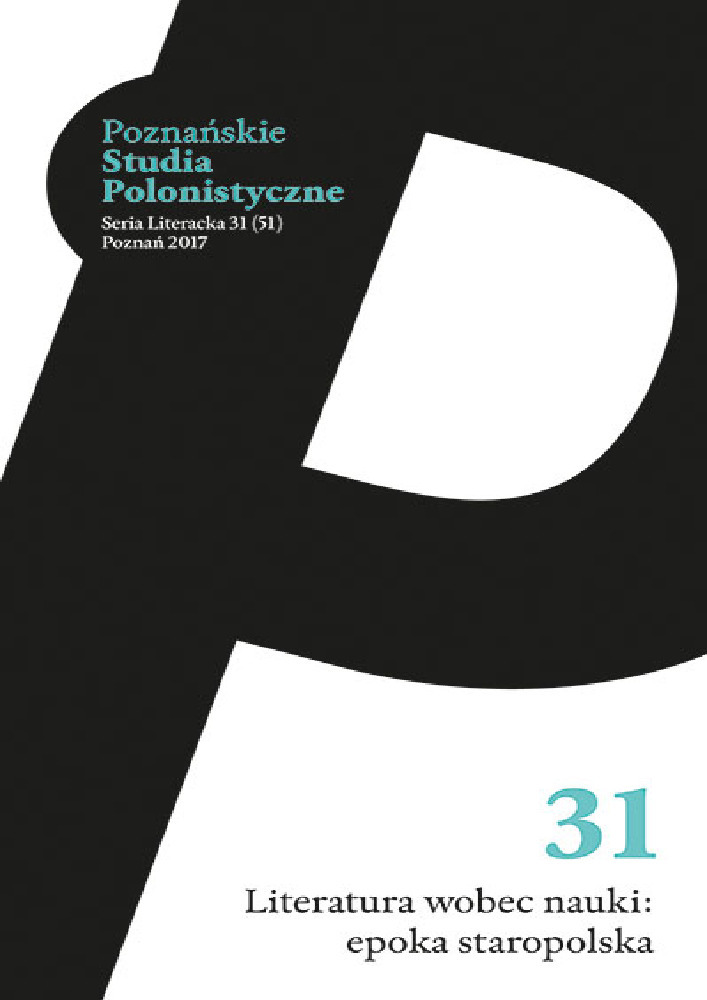Abstract
The article presents the issue of philosophy and science cultivated by the Polish Jesuit, Fr Wojciech Tylkowski (1624-1695), a polymath viz. scientist of many varied interests. Tylkowski acted primarily as an educator and lecturer in philosophy at schools run by the Jesuit Order. Tylkowski aspired toward mastering all philosophical and natural science known to him. The notion of the complete scholar of the baroque period – the homo universalis – was a crucial factor in his way of thinking and scientific work. The synthesizing of all knowledge known to him marked the purpose of his writing. For this very reason he also led independent studies, which resulted in his writing activity in the fields of philosophy, theology, astronomy, mathematics, geography, technology, art, and even agriculture. Tylkowski practised philosophy in the spirit of the Aristotelian-Scholastic tradition. An important area of his writing initiative is the so-called philosophia curiosa , understood as philosophy that evokes in the mind of the recipient an interest in the world and knowledge of the subject. Tylkowski was an original representative of this style of practising philosophy and science. His books, especially those written in the popularized convention, the philosophia curiosa , were directed towards a wide circle of readers.References
Bargieł Franciszek (1986), Wojciech Tylkowski SJ i jego Philosophia curiosa z 1669 roku, Wydział Filozoficzny Towarzystwa Jezusowego w Krakowie, Kraków.
Barycz Henryk, (1970), Barok, w: Historia nauki polskiej, t. 2, red. Bogdan Suchodolski, Zakład Narodowy im. Ossolińskich, Wrocław.
Bieńkowski Tadeusz (1987), Polscy przedstawiciele scientia curiosa, „Rozprawy z Dziejów Oświaty”, z. 30, s. 5-84.
Darowski Roman (1998), Studia z filozofii jezuitów w Polsce XVII i XVIII wieku, Wydział Filozoficzny Towarzystwa Jezusowego, Kraków.
Lisiak Bogdan (2005), Adam Adamandy Kochański (1631-1700): Studium z dziejów filozofii i nauki w Polsce w XVII wieku, Wydawnictwo WAM, Kraków.
Lisiak Bogdan (2008), Inspiracje filozofii Wojciecha Tylkowskiego SJ, w: Oblicza filozofii XVII wieku, red. Stanisław Janeczek, Wydawnictwo KUL, Lublin, s. 549-557.
Małkiewicz Adam (1986), Wojciecha Tylkowskiego Censura imaginum iuxta doctrinam, w: Symbolae Historiae Atrium. Studia z historii sztuki Lechowi Kalinowskiemu dedykowane, red. Jerzy Gadomski, Wydawnictwo PWN, Warszawa, s. 447-456.
Ogonowski Zbigniew, (1985), Filozofia szkolna w Polsce XVII wieku, Wydawnictwo PWN, Warszawa.
Okoń Jan (2009), Kompendium – czy tylko wiedzy? Wstęp do typologii gatunku, w: Staropolskie kompendia wiedzy, red. Iwona M. Dacka-Górzyńska, Joanna Partyka, Wydawnictwo DiG, Warszawa, s. 9-31.
Raubo Grzegorz (2011a), Kurioza i zagadki nauk (o „Uczonych rozmowach” Wojciecha Tylkowskiego), [w:] tegoż, Kalendarze, kurioza i rzeczy ostateczne. Z zagadnień literatury popularnej w dawnej Polsce, Kalisz.
Raubo Grzegorz (2011b), „Ludzie na górne zapatrują się obroty”. Astronomiczne konteksty literatury polskiego baroku, Wydawnictwo naukowe UAM, Poznań.
Rossi Paolo (2001), Uczony, w: Człowiek baroku, red. Rosario Villari, przeł: Bogumiła Bielańska, Monika Gurgul, Monika Wożniak, Wydawnictwo Volumen, Warszawa, s. 315-343.
Tazbir Janusz (1978), Wojciech Tylkowski – polihistor ośmieszony, „Kwartalnik Historii Nauki i Techniki”, z. 23, s. 83-100.
Vasoli Cesare (1989), Encyklopedyzm w XVII wieku, przeł. Adam Aduszkiewicz, Wydawnictwo PAN IFiS, Warszawa.
Whitehead Alfred North (1987), Nauka i świat nowożytny, przeł: Maciej Kozłowski i Marek Pieńkowski OP, Wydawnictwo ZNAK, Kraków.
License
Authors
Authors of texts accepted for publication in „Poznańskie Studia Polonistyczne. Seria Literacka” are required to complete, sign and return to the editor's office the Agreement for granting a royalty-free license to works with a commitment to grant a CC sub-license.
Under the agreement, the authors of texts published in „Poznańskie Studia Polonistyczne. Seria Literacka” grant the Adam Mickiewicz University in Poznań a non-exclusive, royalty-free license and authorize the use of Attribution-NoDerivatives 4.0 International (CC BY-ND 4.0)Creative Commons sub-license.
The authors retain the right to continue the free disposal of the work.
Users
Interested Internet users are entitled to use works published in „Poznańskie Studia Polonistyczne. Seria Literacka” since 2016, for non-commercial purposes only, under the following conditions:
- attribution - obligation to provide, together with the distributed work, information about the authorship, title, source (link to the original work, DOI) and the license itself.
- no derivatives - the work must be preserved in its original form, without the author's consent it is not possible to distribute the modified work, such as translations, publications, etc.
Copyrights are reserved for all texts published before 2016.
Miscellaneous
Adam Mickiewicz University in Poznań retains the right to magazines as a whole (layout, graphic form, title, cover design, logo etc.).
